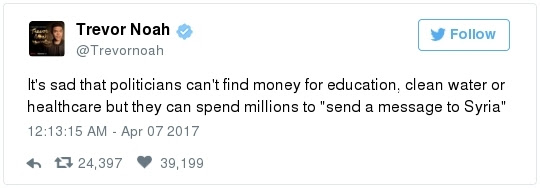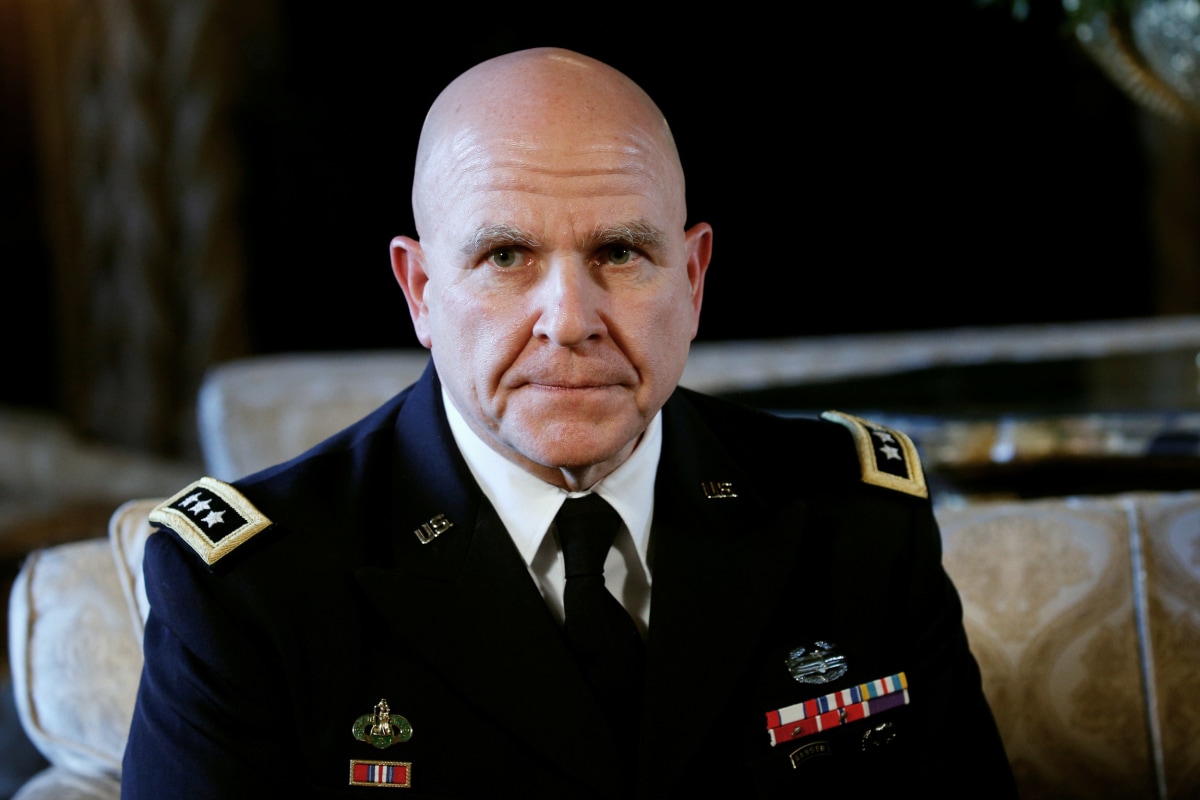
The political context of all this cannot be ignored. The missile strike came at a moment when Trump had record-low approval ratings, while many Democrats were accusing him of being a Russian stooge. Prior to this week, he had expressed little public concern about the victims of Assad’s brutality, and had seemed content to let the Syrian leader crush the remaining resistance to him, with Russian assistance. By launching the attack, he has shaken up the domestic political environment, as well as the geopolitical one. “Because from now on, the narrative that the president is some kind of puppet of Russian President Vladimir Putin is going to be much harder to promote,” Jake Novak, a columnist at CNBC.com, wrote on Friday. Given Trump’s gushing statements about Putin in the past, and the ongoing F.B.I. investigation into possible connections between Russia and some of Trump’s associates, this is a tendentious interpretation, to say the least. But in the coming days it is an argument that the White House and its Republican allies will be eager to promote.
 A LONG GAME IS A LOSING GAME
STEVE COLL, NEW YORKER
On August 7, 1998, Al Qaeda suicide bombers struck two U.S. embassies in East Africa, killing two hundred and twenty-four people, most of them Africans. Two weeks later, President Bill Clinton launched Operation Infinite Reach, a fusillade of cruise missiles aimed at a reported Al Qaeda meeting in Afghanistan, and at a factory in Sudan, which was suspected of involvement with chemical weapons. “There will be no sanctuary for terrorists,” Clinton declared. The retaliation produced few tangible benefits. And yet, since then, from Kosovo to Waziristan to Libya, the United States has repeatedly threatened or carried out missile and drone attacks and air strikes for limited and sometimes imprecise purposes. In the modern Presidency, firing off missiles has become a rite of passage.
A LONG GAME IS A LOSING GAME
STEVE COLL, NEW YORKER
On August 7, 1998, Al Qaeda suicide bombers struck two U.S. embassies in East Africa, killing two hundred and twenty-four people, most of them Africans. Two weeks later, President Bill Clinton launched Operation Infinite Reach, a fusillade of cruise missiles aimed at a reported Al Qaeda meeting in Afghanistan, and at a factory in Sudan, which was suspected of involvement with chemical weapons. “There will be no sanctuary for terrorists,” Clinton declared. The retaliation produced few tangible benefits. And yet, since then, from Kosovo to Waziristan to Libya, the United States has repeatedly threatened or carried out missile and drone attacks and air strikes for limited and sometimes imprecise purposes. In the modern Presidency, firing off missiles has become a rite of passage.
-------
Syria’s civil war is the worst geopolitical disaster of the twenty-first century. It has claimed at least four hundred and seventy thousand lives; prompted a refugee crisis that has destabilized European politics and fuelled the rise of nativist populism; and created a playing field for Russian and Iranian adventurism in the Middle East. Six years of efforts to end the war through diplomacy have failed. The interference of regional and global powers, combined with the fragmentation of militias and guerrillas on the battlefield, have made the conflict appear all but unresolvable. During the past year, the more mainstream rebels opposing Assad have suffered repeated setbacks, including the loss of Aleppo, Syria’s second-largest city.
Why, then, would the Trump Administration want to lob a few dozen cruise missiles into this splintered landscape? One limited rationale might be that Syria’s conflict has eroded global treaties banning the use of chemical arms—every time Assad gasses civilians, he increases the likelihood that another dictator or general will use them. It seems odd, though, to initiate armed intervention to prevent one sort of Syrian war crime but not others. Assad has tortured and executed thousands of his own people. Syrian and Russian forces routinely violate international law by targeting civilians, physicians, and rescue workers with bombs and artillery shells. And, if Trump has suddenly been moved to address the suffering, he might start recognizing the legitimacy of Syrians as refugees of war and welcoming them to resettle in the United States.
If President Trump broadens his aims against Assad, to establish civilian safe havens, for example, or to ground Syria’s Air Force, or to bomb Assad to the negotiating table, he will enter the very morass that Candidate Trump warned against. He would have to manage risks—military confrontation with Russia, an intensified refugee crisis, a loss of momentum against isis—that Obama studied at great length and concluded to be unmanageable, at least at a cost consistent with American interests.
Since the Cold War’s end, the United States has led or joined more than half a dozen wars or armed interventions lasting longer than a few months, including the ouster of Iraqi forces from Kuwait, in 1991; the conflicts in Somalia, Bosnia, and Kosovo; the invasions of Afghanistan and Iraq after 9/11; and, in 2011, during the Arab uprisings, the removal of the Libyan dictator Muammar Qaddafi. A few of these wars achieved their aims, albeit at a cost in lives and treasure; others went sideways or turned into disasters, as in Libya, where Obama’s intervention has been followed by six years of chaos, civil war, and the rise of a branch of isis. You don’t need an advanced degree in military history to identify the main lessons: once started, even limited wars upend initial plans and assumptions, violence produces unintended consequences, and conflicts are much easier to begin or escalate than to end.
Read more at STEVE COLL, NEW YORKER
 CIVILIAN KILLINGS BEGET MORE CIVILIAN KILLINGS
JUAN COLE, TRUTHDIG
CIVILIAN KILLINGS BEGET MORE CIVILIAN KILLINGS
JUAN COLE, TRUTHDIG
---------
The Reagan administration shamefully ran interference for six years as Saddam Hussein of Iraq systematically deployed chemical weapons against Iranian troops at the front. Everyone knew this was going on.
Iraq used chemical weapons for the same reason that the Syrian army does. They are deployed to level the playing field in the face of superior manpower on the other side. Saddam Hussein had a country of 16 million and invaded a country of some 40 million. US military doctrine of the time was you should only invade at a ratio of 3 to 1. So Saddam would have needed a country of 120 million to invade Iran. Needless to say, he lost the war very badly after an initial lightning invasion, since Iran could always over time raise a much bigger army than Saddam could. Hence the use of mustard gas and sarin gas on Iranian troops at the front.
Some Syrian military units have a chem team in case they face being overwhelmed by a more numerous enemy. The Syrian army was 300,000 before the war. It is at most 50,000 now. That number is not sufficient to control the whole country, though with the help of the Lebanese Hizbullah and Iraqi militias and some Afghans dragooned by the Iranian Revolutionary Guards Corps, plus vigorous Russian air support, they have been able to fight off the rebels and to take most urban areas. The small number of troops means that when they fight in a rebel-held territory like Idlib Province, they are tempted to deploy chemical weapons to offset their small numbers.
But it is indiscriminate fire and reckless disregard for innocent life that is the war crime here, and indeed a repeated pattern of war crimes is considered a crime against humanity.
By the way, Russian bombing has often been indiscriminate, but somehow Moscow has skated on war crimes accusations growing out of its heavy-handed role in Syria.
As for those decrying Obama inaction they need to, like, read the news sometime. For the past several years the US has intervened in Syria in two ways. President Obama used the Saudis to deliver money and weaponry to some 40 “vetted” groups supported by the Central Intelligence Agency, which is certified as having no ties to al-Qaeda or international extremism. Except that several of these groups have in fact formed battlefield alliances with al-Qaeda in Syria (was Jabhat al-Nusra, now Jabhat Fateh Sham or the Syrian Conquest Front)...
[Further] the rebel groups committed their own massacres of civilians.
------
Trump can’t stop Syria from using poison gas by bombing Damascus. Since he’s such a good buddy of Russian president Vladimir Putin, maybe he could pressure Putin to have Bashar al-Assad cut it out.
But that somehow the Syria situation can be made better if only Donald J. Trump would stick his fingers into it is a wildly implausible premise.
Read the entire article at JUAN COLE, TRUTHDIG
/cdn0.vox-cdn.com/uploads/chorus_asset/file/8324091/510757288.jpg)












